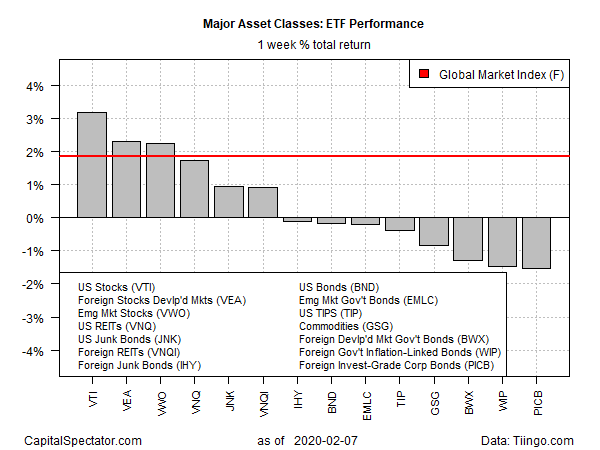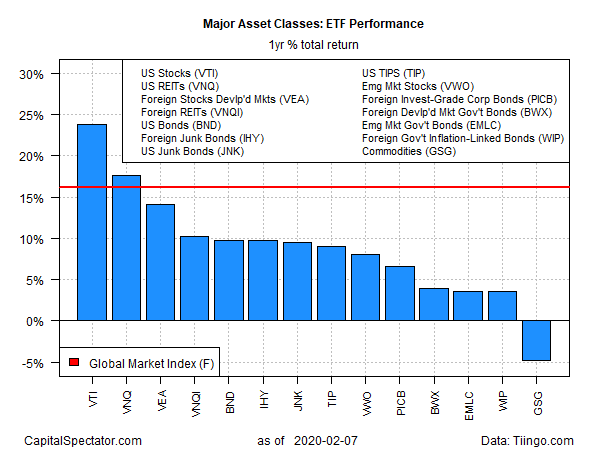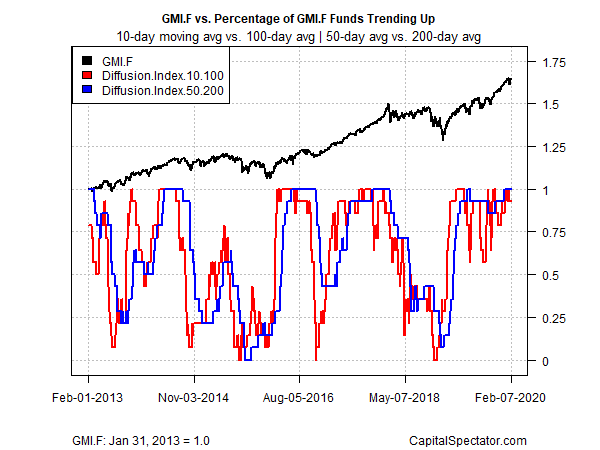China, the world’s second-largest economy, continues to suffer in human and economic terms from the coronavirus, but there were minimal signs of concern in last week’s performance of the US equity market, which posted the strongest increase for the major asset classes, based on a set of ETFs.
Vanguard US Total Stock Market (NYSE:VTI) surged 3.2% for the trading week ended Friday, Feb. 7. Although the fund slipped modestly at the end of the week, VTI set a record high on Thursday.
Despite the rally, long-time market bull Ed Yardeni of Yardeni Research tells CNBC: “The longer that this virus threat continues to weigh on the global economy, the more it poses a risk for at least a correction in the stock market.”
China, of course, is ground zero for the virus and so the country will bear the brunt of the economic price tag as portions of the economy remain shuttered. “This coronavirus seems to be going on for longer, is infecting more people and the hit to growth will be longer,” advises Diana Mousina, an economist at AMP Capital Investors, via Bloomberg.
Despite concern over potential economic fallout from the virus, in China and beyond, stocks generally posted gains last week around the world in broad regional terms. Vanguard FTSE Developed Markets (NYSE:VEA) and Vanguard FTSE Emerging Markets (NYSE:VWO) posted solid gains during the trading week.
Last week’s big loser for the major asset classes: foreign corporate bonds. Invesco International Corporate Bond (NYSE:PICB) shed 1.5%–the fund’s first weekly setback in four weeks.
Meanwhile, the Global Market Index (GMI.F) continued to rise. This unmanaged benchmark that holds all the major asset classes (except cash) in market-value weights increased 1.9%–the first weekly rise for the benchmark in three weeks.

US stocks also dominate the trend for the one-year window. Vanguard US Total Stock Market (VTI) is up a strong 23.9% on a total return basis over the past 12 months. That’s well above the second-best one-year performer: US real estate investment trusts (REITs) via Vanguard Real Estate (NYSE:VNQ), which is ahead by 17.7% for the past year.
Broadly defined commodities are the worst one-year performer for the major asset classes. The iShares S&P GSCI Commodity-Indexed Trust (GSG) is down 4.8% vs. the year-ago level.
GMI.F’s one-year total return at Friday’s close: 16.3%, which remains above all but two of the major asset classes for the 12-month window.

Despite continuing concerns about coronavirus risk for the global economy, profiling all the ETFs listed above through a momentum lens still shows a positive trend in most corners of the markets. The analysis is based on two sets of moving averages. The first compares the 10-day moving average with its 100-day counterpart — a proxy for short-term trending behavior (red line in chart below). A second set of moving averages (50 and 200 days) represent an intermediate measure of the trend (blue line). At the end of last week, the only sign of weakening momentum is showing up via commodities (GSG) for the 10-day/100-day profile. Otherwise, every major corner of the major asset classes is posting a positive trend profile.

